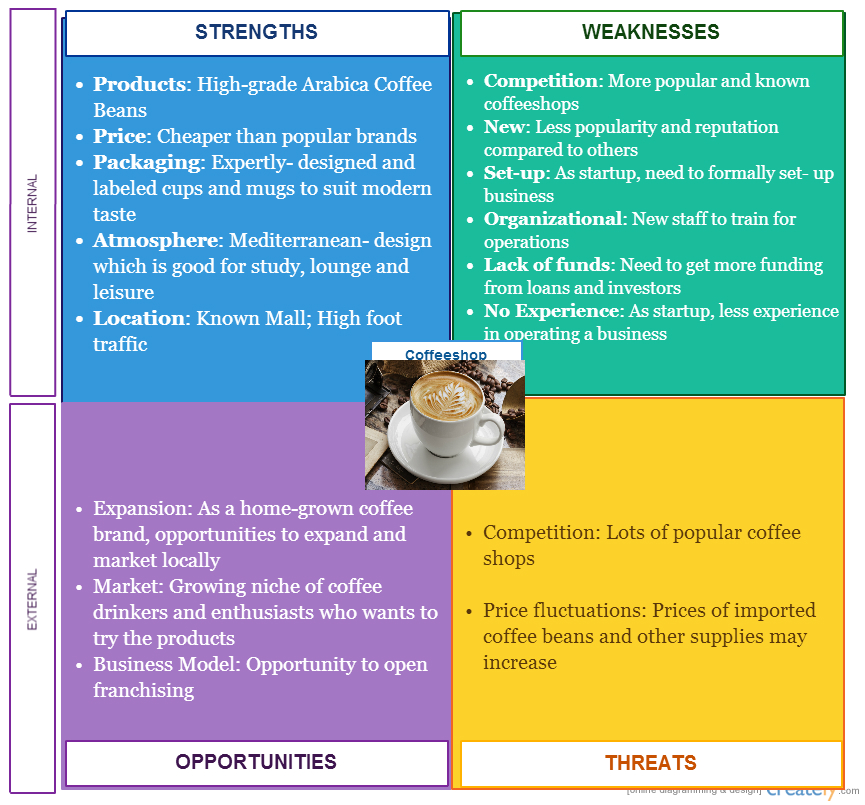SWOT analysis: Importance and Example

For businesses to craft an effective and efficient business strategy, one of the most essential and useful tool is SWOT analysis.
SWOT is the blueprint of your business. It is a framework where you can see, in a nutshell, the determinants of the success or failure of your business. Coming up with SWOT will help you know how to build and expand your business in more ways than one.
For those unfamiliar with SWOT analysis, lets discuss how you will be able to identify the attributes that make up SWOT. A general example of SWOT analysis for a coffee shop is featured below.SWOT stands for Strengths, Weaknesses, Opportunities, and Threats of the organization.
What is SWOT
Strengths and Weakness are internal to the business organization; while Opportunities and Threats are external to the business.
Strengths are the positive characteristics or advantages of the business while weaknesses is the opposite. Opportunities are the positive factors and advantages in the market while Threats are the external factors that can negatively affect the business.
Moreover, according to an article written by Ryan Goodrich, “Strengths and Weaknesses refer to internal factors, which means the resources and experience readily available to you; Opportunities and threats are external factors referring to things you or your company don’t have control of.
-
-
Internal factors include:
- Financial resources
- Physical resources
- Human resources
- Current processes
Source: Ryan Goodrich, SWOT Analysis: Examples, Templates & Definition (January 1, 2015). Retrieved from: http://www.businessnewsdaily.com/4245-swot-analysis.html
-
-
External factors include:
- Market trends
- Economic trends
- Political, environmental and economic regulations
Source: Ryan Goodrich, SWOT Analysis: Examples, Templates & Definition (January 1, 2015). Retrieved from: http://www.businessnewsdaily.com/4245-swot-analysis.html
To give you a better understanding of SWOT, below is an example to help you picture out how to apply SWOT to your business.
Example of SWOT analysis
Just for example, let’s analyze a small downtown coffeeshop. Its products are a wide array of coffee concoctions made from brewed arabica coffee beans. To buddy up with coffee, it also offers different sweet foods such as delicious cakes and pastries.The coffee shop has just opened its first branch in a large mall chain. Below is the SWOT analysis for a coffee shop:

Having analyzed its Strengths, Weaknesses, Opportunities and Threats, we can infer that the coffeeshop needs to implement effective marketing strategies to capture the niche of coffee-drinkers. It needs to develop and implement a marketing plan that will draw customers in and make them try out the new coffee craze in town.
As a startup, the coffee shop needs to look for more funding in order to continue business operations. Aside from that, the new coffeeshop needs to be unique and competitive compared to well- known coffee shops. It has to differentiate itself and be a cut above the rest among coffee shops in that area.
Make your own SWOT
Remember that, SWOT is unique to each and every business. As your business changes and grows, you must be able to revise, update and improve your SWOT.
Furthermore, there are useful applications on the Internet that offers free SWOT templates you could work on such as Creately software. So, there’s no reason for you not to explore the tools and make SWOT analysis for your business. Now, it’s time for you to make your own SWOT!
Source:
Ryan Goodrich, SWOT Analysis: Examples, Templates & Definition (January 1, 2015). Retrieved from: http://www.businessnewsdaily.com/4245-swot-analysis.html